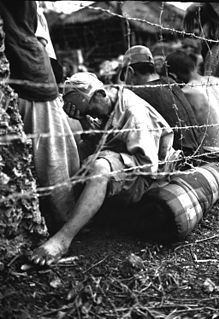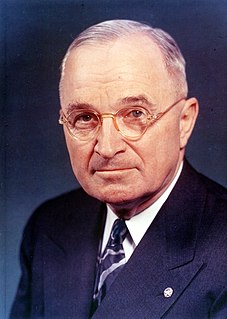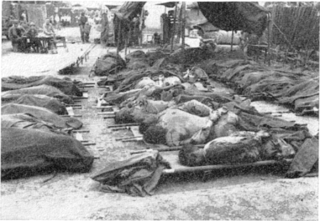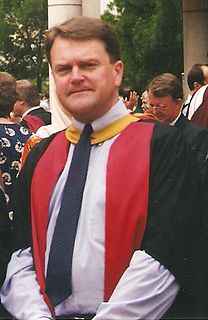External links
- Brief biography and c.v. – University of South Carolina, Department of History
Simon MacKenzie (also known as S.P. MacKenzie) is a military historian, author and academic. He was educated at the University of Toronto and received a DPhil from the University of Oxford in 1989.
MacKenzie teaches at the University of South Carolina. He has won the Templer Medal, awarded by the Society for Army Historical Research (“for the book which in the Society’s view has made the greatest contribution to the study of British military history.”) for his 1992 book, 'Politics and Military Morale: Current-Affairs and Citizenship Education in the British Army 1914–1950'.

The Korean War was fought between North Korea and South Korea from 1950 to 1953. The war began on 25 June 1950 when North Korea invaded South Korea following clashes along the border and rebellions in South Korea. North Korea was supported by China and the Soviet Union while South Korea was supported by the United States and allied countries. The fighting ended with an armistice on 27 July 1953.

A prisoner of war (POW) is a person who is held captive by a belligerent power during or immediately after an armed conflict. The earliest recorded usage of the phrase "prisoner of war" dates back to 1610.

Militarism is the belief or the desire of a government or a people that a state should maintain a strong military capability and to use it aggressively to expand national interests and/or values. It may also imply the glorification of the military and of the ideals of a professional military class and the "predominance of the armed forces in the administration or policy of the state".
Sir John Desmond Patrick Keegan was an English military historian, lecturer, writer and journalist. He wrote many published works on the nature of combat between prehistory and the 21st century, covering land, air, maritime, intelligence warfare and the psychology of battle.
An official history is a work of history which is sponsored, authorised or endorsed by its subject. The term is most commonly used for histories which are produced for a government. The term also applies to commissions from non-state bodies including histories of commercial companies. An official biography is an authorised biography.

The People's Volunteer Army (PVA) was the armed expeditionary forces deployed by the People's Republic of China during the Korean War. Although all units in the PVA were actually transferred from the People's Liberation Army under the orders of Chairman Mao Zedong, the PVA was separately constituted in order to prevent an official war with the United States. The PVA entered Korea on 19 October 1950, and completely withdrew by October 1958. The nominal commander and political commissar of the PVA was Peng Dehuai before the ceasefire agreement in 1953, although both Chen Geng and Deng Hua served as the acting commander and commissar after April 1952 due to Peng's illness. The initial units in the PVA included 38th, 39th, 40th, 42nd, 50th, 66th Corps; totalling 250,000 men. About 3 million Chinese civilian and military personnel had served in Korea throughout the war.
Sir Michael Eliot Howard was an English military historian, formerly Chichele Professor of the History of War, Honorary Fellow of All Souls College, Regius Professor of Modern History at the University of Oxford, Robert A. Lovett Professor of Military and Naval History at Yale University, and founder of the Department of War Studies, King's College London. In 1958, he co-founded the International Institute for Strategic Studies.

This is a bibliography of major works on the History of Canada.

The Society for Military History is a United States–based international organization of scholars who research, write, and teach military history of all time periods and places. It includes naval history, air power history, and studies of technology, ideas, and homefronts. It publishes the quarterly refereed The Journal of Military History.

List of World War I books is a bibliography using APA style citations of a selection of books on World War I.
Robert John O'Neill, is an Australian historian and academic. He is chair of the International Academic Advisory Committee at the United States Studies Centre at the University of Sydney, was director of the International Institute for Strategic Studies, based in London, from 1982 to 1987, and Chichele Professor of the History of War at the University of Oxford from 1987 to 2000.
The Society for Army Historical Research is a learned society, founded in 1921 to foster "interest in the history and traditions of British and Commonwealth armies, and to encourage research in these fields." It is one of the oldest societies of its kind. Past members include notable British Field Marshals Wavell, Auchinleck and Templer. The current president is Lieutenant-General Sir Barney White-Spunner and Major-General Ewan Carmichael is Chairman of its Council. The Patron of the Society is Field Marshal the Duke of Kent.

It has been estimated that prior to the end of the Pacific War in August 1945, 10 million members of the Imperial Japanese military were captured alive or surrendered to Western Allied forces. Also, Soviet troops seized and imprisoned more than half a million Japanese troops and civilians in China and other places. The number of Japanese soldiers, sailors, marines, and airmen who surrendered was limited by the Japanese military indoctrinating its personnel to fight to the death, Allied combat personnel often being unwilling to take prisoners, and many Japanese soldiers believing that those who surrendered would be killed by their captors.

The following events occurred in July 1950:

The following events occurred in August 1950:

The following events occurred in September 1950:

Jeffrey Guy Grey was an Australian military historian. He wrote two volumes of The Official History of Australia's Involvement in Southeast Asian Conflicts 1948–1975, and several other high-profile works on Australia's military history. He was the first non-American to become the president of the Society for Military History, but is perhaps best known as the author of A Military History of Australia.

The United Kingdom home front during World War II covers the political, social and economic history during 1939–1945.

Alan Winnington was a British journalist, war correspondent, and Communist activist most famous for his coverage of the Korean War and the Chinese revolution. He is most well-known as the author of I Saw Truth in Korea (1950), an anti-war pamphlet containing photographic evidence of the mass graves of civilians executed by the South Korean police. The publishing of this leaflet led to the British government debating whether to have Winnington tried for treason, a charge which carried the death penalty, though it was decided instead to make him stateless by refusing to renew his passport.